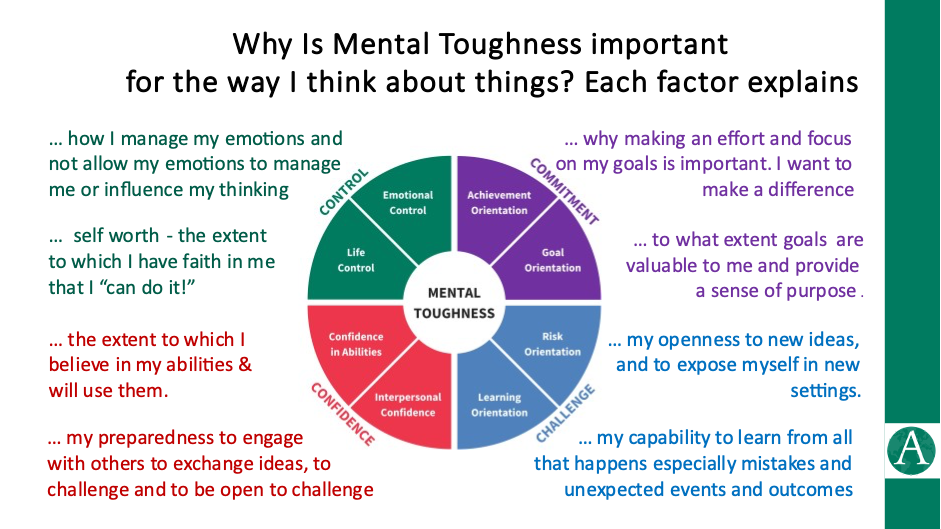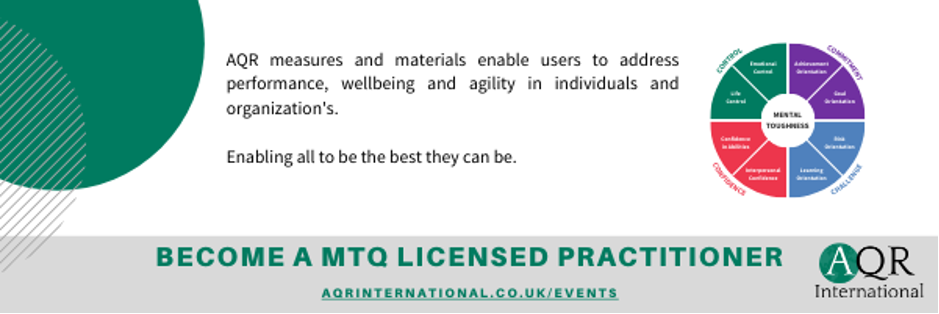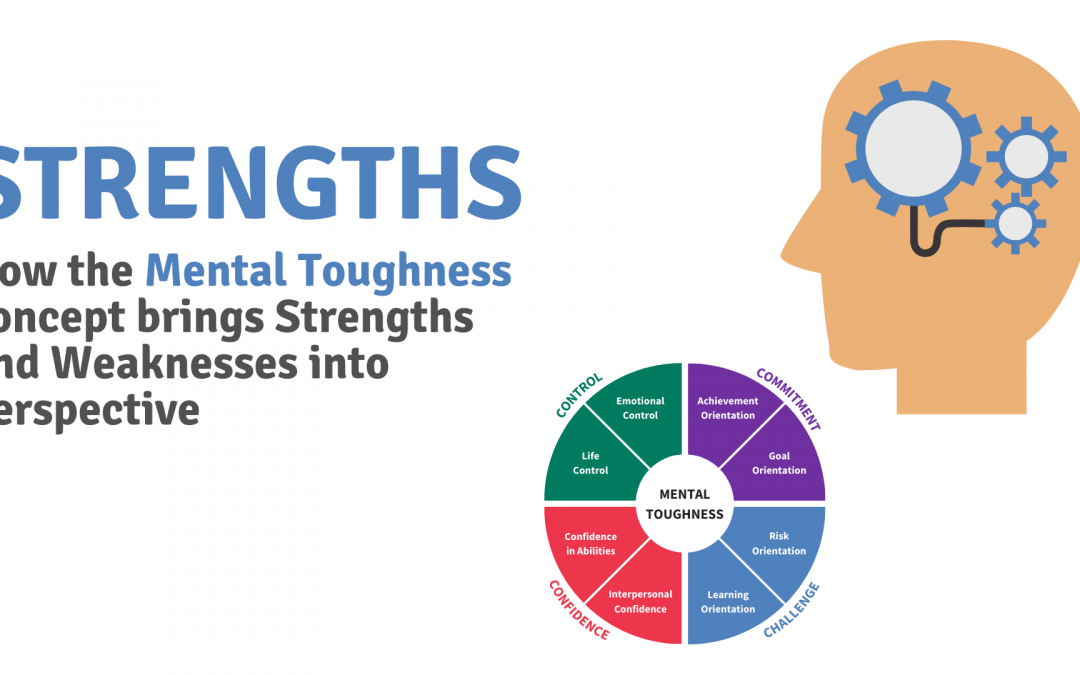Why the mental toughness concept can bring a fresh and important insight to this question.
Why do we need to question our understanding of strengths
For as long as I can remember, we have been encouraged to “play to our strengths”. At first sight, this makes a lot of sense.
More recently, we see this idea creeping into people development ideology and practice. Again, there is an obvious appeal for this idea. The thinking is that you shine a light on who you are at your best. Your strengths are often described as the talents that you’ve developed and are a composite of your skills, knowledge and experience. There is a strong behavioural focus here.
The theory goes: “when you know your strengths, you are able to see yourself from a perspective that enables you to progress no matter your current circumstances.
But is it as simple as this?
We tend to speak of “Strengths” and Weaknesses” as though they are opposite ends of a spectrum and that they are discrete. We also tend to assume that these are innate qualities possessed by an individual irrespective of circumstances.
Neither of these assertions stands up to close scrutiny because reality is more complex than these assertions would afford.
In our now 25-year journey with the mental toughness concept, we have learned to avoid “black and white” thinking and to understand that people, far from being simple, can be, and are, incredibly complex. For a people developer, this is a big challenge. It requires understanding where that complexity comes from and how you can manage it in your work with people.
Similarly, “nuance” matters. People, and their behaviours, may look alike but they are all different to a degree. What may look like a strength for one person may not be that for another, even though everything looks the same.
So, how can the mental toughness concept shine a light on this?
In the first place both research and the work of practitioners show that when we talk about mental toughness, we are talking about a profile of scales that have mental toughness at one end and mental sensitivity at the other. These are not synonyms for strength and weakness or for good and bad.
They describe different mental approaches to what happens to us and to what happens around us.
Why we avoid describing mental toughness in terms of strength and weakness is explained in an earlier post*.
Instead, we find it much more useful to use the terms “advantage” and “disadvantage”. That is, different levels of mental toughness bring advantages and disadvantages to an individual.
This is true for each of the 8 factors which contribute to our overall level of mental toughness.
The extent to which the two poles balance translates into a potential strength or a potential weakness and, importantly, depends on a number of factors, many of which are external to an individual. This can include things like situation, requirements of the task in hand, the way others respond, and, most importantly, self-awareness about their mental approach to events.
Let’s look at an example. Take the Life Control (LC) factor. Our individual has assessed their level of mental toughness (using the MTQPlus measure) on LC at Sten 8 (i.e., higher than around 85-90% of the population).

Life Control describes the individual’s level of self-worth, their belief in themselves as a worthwhile person, as well as the extent to which they are minded to “have a go” and adopt a “can do” spirit even when they are not certain that they have the skills or knowledge to do it. They feel insufficient control to be able to do what they need to achieve.
This is not behaviour. It is an attitude of mind.
A score at Sten 8 suggests that this individual is probably very likely to be mentally tough in this regard and will approach what they are doing with the mindset just described.
Is this a strength? At first sight, we might think it is. But actually, we don’t know that it is.
Can this, at the same time, be a weakness? Imagine:
- The individual is faced with a challenge which is, in reality, impossible. They may try and they may fail and pointlessly exert a lot of their effort and the effort of others in doing so.
- The individual is supported by those who have much lower levels of life control than they do. The difference in response can intimidate others, can frustrate the individual and can lead to angry exchanges “I can do it, why can’t you?”.
- The individual is attempting to do something without having everything they need in terms of resources to deliver.
- The individual takes it all on because they believe they can do it all … and burns out.
Is this still a strength? It is exactly the same mindset.
This is true for every one of the 8 factors in the mental toughness concept and, when summed, it is equally true for one’s overall level of mental toughness or mental sensitivity.
No factor of mental toughness, or any identified strength (or for that matter, weakness), exists in isolation. To understand how this influences behaviours, wellbeing, or achievements, we need to recognise how it interacts with other factors, including factors beyond this model.

So, it would seem that what we are looking at is the balance between advantage and disadvantage at each level of mental toughness in each of its aspects.
That balance between them determines whether the way that the individual approaches challenges and events is likely to emerge as a strength or a weakness.
The key here is to be truly self-aware about one’s level of mental toughness across all its factors and understand the consequences of that for the situation they face. This in turn will enable the individual to “create” the strengths they need to be able to play to them.
This is not easy to do since our mental approach sits in our minds and is generally invisible to us and to others.
Maybe, we have always understood that to some extent, a strength can also be a weakness.
To be able to “play to our strengths, it’s important not just to know what they are, but also to know from where they arise. That helps us to optimise them and minimise the risk that they reveal themselves as weaknesses.
The mental toughness concept, in its 8-factor form, gives us the framework through which we can explore this. The mental toughness questionnaire, the MTQPlus gives us the capability to understand just what our level of mental toughness might be.
Taking external factors into account enables us to understand better what a strength really is, what our strengths might be and how to use them to our best advantage.
To know more about the mental toughness concept and measure see www.aqrinternational.co.uk.
To learn how to be a licensed user of the mental toughness concept and the MTQPlus measure, contact headoffice@aqr.co.uk

The article is co-produced by
Doug Strycharczyk, AQR International
Dr John Perry, University of Limerick, Ireland
Professor Peter Clough, AQR International
References:
*https://aqrinternational.co.uk/?s=Mental+Strength&et_pb_searchform_submit=et_search_proccess&et_pb_include_posts=yes&et_pb_include_pages=yes
What is Strengths Based Coaching? Patricia Swartz


